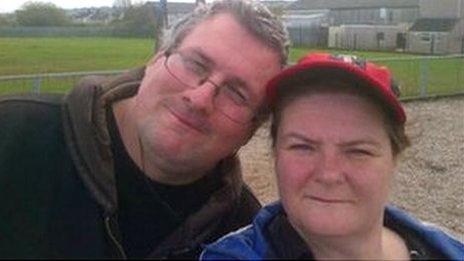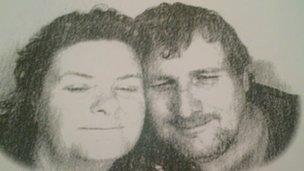Minimum wage visa rules keep man and wife apart
- Published

David and Dee Hook have only seen each other in person once in the last year
A Swansea man says "unjust" changes to visa rules are stopping him from bringing his Canadian wife to Wales.
Last year, the UK government insisted that someone must earn at least £18,600 a year before they are eligible to bring their partner to the UK.
David Hook says he earns the minimum wage as a security officer in Swansea - and cannot meet the new earning target.
A BBC Wales investigation found the rules would apply to half the Welsh workforce.
Mr Hook said: "In south Wales I was working as a construction labourer on the minimum wage. You're not going to make that [minimum income] a year. Now I'm working in security and again most of that is minimum wage.
"The most I've ever earned is about £14,000 a year - and that was working 70, 75 hours a week."
'Unhappy' reunion
The 45-year-old had not seen his wife Dee for a year, until a recent reunion at Gatwick airport.
But it was not a happy meeting - she was refused entry to the UK by immigration officials and was detained for two days in a removal centre.
"I never want to have to do that again - tell my wife that she's not allowed to come and see me," he told the BBC Wales Eye on Wales programme.
"It hurts. It hurts me, it hurts her. She's crying, I'm crying.
"Anger's the only thing that's getting me through this. If I stop being angry, I cry."
The new rules brought in by the UK government apply to non-EU citizens like Mrs Hook.
But the legality of the new system has been challenged in the courts.
As a result, all spouse visa applications have been frozen - including the Hooks'.
Tough choices
The decision has left them in a legal limbo, and led to some tough decisions for 42-year-old Mrs Hook.
"Due to the length of time for them to process our original application I've had to pull my application to attend my son's wedding in the Philippines in December," she explained.
"So we have to start all over.
"It was almost like having to choose between my husband and my son."
The UK Border Agency says its decision not to allow Mrs Hook into the country as a visitor was on the basis of that previous application for a visa as a spouse.
A spokesman told BBC Wales: "In light of this application, and following further enquiries, our officers were not satisfied she would leave the UK after a short visit as claimed."
The Migration Observatory, external, based at Oxford University, says the new minimum income requirement for sponsoring a family visa for a partner from outside the EU is substantially higher than the previous one.
It estimates that 51% of working people in Wales do not earn enough to meet the new requirements.
Official government statistics, external estimate that the average (median) income of households in Wales in 2010 was £18,000 - again under the threshold.

A prized portrait of the couple - despite being married six years - they remain apart
The issue is now being considered by the courts, after a ruling in July this year that while the minimum earning threshold was not unlawful, it was "onerous" and "unjustified".
The High Court has urged the Home Office to to reduce the threshold to about £13,000 a year - a move that the government is appealing against.
In the meantime, David and Dee Hook are hoping to find a way around the regulations, using EU legislation.
If Mr Hook can find work in another EU country, such as the Republic of Ireland, for three months, his wife will legally be able to join him there.
David and Dee Hook talk to Felicity Evans of BBC Radio Wales
Under freedom of movement laws, the couple could then move back to the UK.
But Mr Hook said it was doubtful they would ever return.
"I think we are probably going to move to another country and we are probably going to stay there," he said.
"It's going to affect my relationship with my children - my youngest is 16 years old - but it's either that or my wife.
"Based on the way this country has treated my family, I hold no loyalty to it."
Eye on Wales is on BBC Radio Wales on Sunday 27 October at 13:30 GMT.
- Published5 July 2013
- Published10 June 2013
- Published14 April 2011
- Published6 November 2012